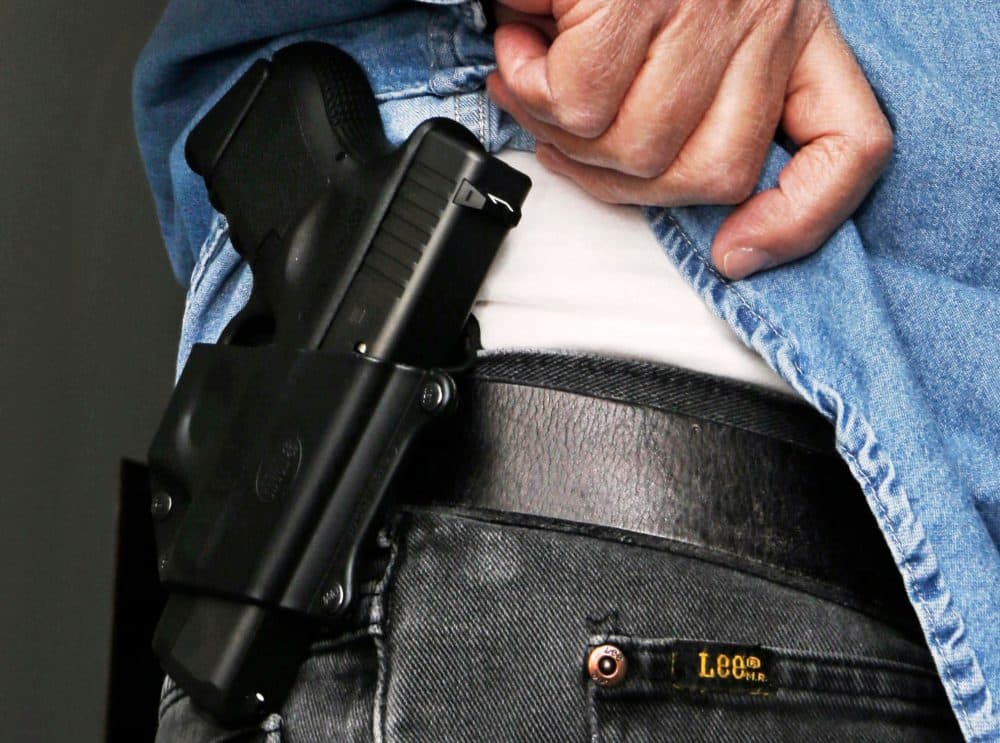Advertisement
BU Study: States With Tighter Laws On Concealed Carry Have Lower Rates Of Handgun Homicides
Resume
States like Massachusetts, which have some of the tightest laws regulating who can carry a concealed handgun, have significantly lower rates of handgun homicides than states with more lax handgun permitting laws.
That's according to a new study from Boston University, released Thursday in the American Journal of Public Health.
One of the central questions in the debate about how to reduce gun violence is whether laws that make it easier to carry a concealed handgun lead to more or fewer homicides. One side says: The more guns out there, the safer we are, because they deter crime. The other side says: The more guns out there, the less safe we are. Several studies over the years have yielded conflicting answers as to who's right.
Now come the results of a 25-year study from the BU School of Public Health, and the conclusion: States that make it tougher to carry a concealed weapon have lower rates of handgun homicides.
"I think what this study suggests is that this trend toward increasingly lenient concealed carry laws is actually having an adverse impact on the public's health because it's increasing the risk of homicide," said Dr. Michael Siegel, lead author of the study.
All 50 states allow people to carry concealed handguns, but there are three big differences in the permitting process. Here are the permit categories for the study period, which went through 2015:
- Twelve states require no permit at all to carry a concealed handgun.
- Nine states, including Massachusetts, do — and give police chiefs wide discretion over whether to issue a permit. These are called "may issue" states, because the cops may deny a permit if they judge applicants to be potentially violent — even if they have no criminal history.
- Twenty-nine states require permits, but give police chiefs little or no discretion. As long as applicants meet certain criteria, they shall get a permit. These are called "shall issue" states.
The study found that handgun homicide rates in these less restrictive "shall issue" states were 10.6 percent higher than homicide rates in more restrictive "may issue" states, like Massachusetts.
"So we think that there's two things going on," Siegel said. "More people are out there with concealed guns. And No. 2, riskier people — people with higher risk for violence — are out there with these guns."
In other words, this study concludes: The more guns out there, the less safe it is.
John Rosenthal, head of Stop Handgun Violence, says the study affirms common sense.
"More guns lead to more gun violence," he said. "And tougher restrictions to make it harder for kids, criminals and the dangerously mentally ill to get concealed handguns in particular leads to lower gun death rates."
But this study won't end the debate.
Jim Wallace of the Gun Owners' Action League of Massachusetts, an NRA affiliate, says he's skeptical of the conclusion. And he's critical of laws in "may issue" states like Massachusetts that make it harder to carry a concealed gun.
"The problems we've had here in Massachusetts and in other states that have 'may issue' is that it's been abused," he said. "You have police chiefs that for political purposes that just don't like to issue firearms licenses, so they're actually abusing people's civil rights even though they have absolutely no reason to do so."
Police chiefs say discretion to deny a gun license gives them an important tool to protect the public.
The study comes as Congress considers a so-called "national concealed carry reciprocity" bill. If passed, it would allow anyone to carry a gun in any state as long they have a concealed carry permit in their own state.
The law is being pushed by the NRA. "It's just common sense for gun owners who live in, say, South Carolina, but are visiting relatives in Massachusetts," an NRA ad says. "Why should Massachusetts be able to deny their right to conceal carry for self-defense?"
GOAL's Wallace says the law would protect 2nd Amendment rights of legal gun owners moving across state lines.
"They never committed a crime in their life, maybe never even had a traffic ticket in their life," he said. "But because they crossed a state border, they're suddenly a felon and their life is destroyed, and that's simply wrong. We can't do that in this country any more."
But gun control advocates, like Rosenthal, say a national concealed carry reciprocity law would badly undermine gun laws in states like Massachusetts. And he says it's inconsistent of conservative lawmakers to support this on the one hand, and states' rights on the other.
"The bottom line is they support blood-money campaign contributions from the NRA, and they will put their states' rights argument aside in order to support gun rights," he said. "Hypocrisy has become the least fatal sin in Washington."
With a pro-gun Donald Trump in the White House and the NRA exerting major influence in a Republican-controlled Congress, the national concealed carry reciprocity bill has a good chance of becoming law — even as the BU study on concealed weapons adds important questions to the debate.
Correction: An earlier version of this story stated that Maine and New Hampshire require permits to carry a concealed gun. That was the case during the time of the study (1991-2015), but Maine passed a concealed carry law with no permit required in 2015 and New Hampshire passed one earlier this year. We regret the error.
This article was originally published on October 19, 2017.
This segment aired on October 19, 2017.
